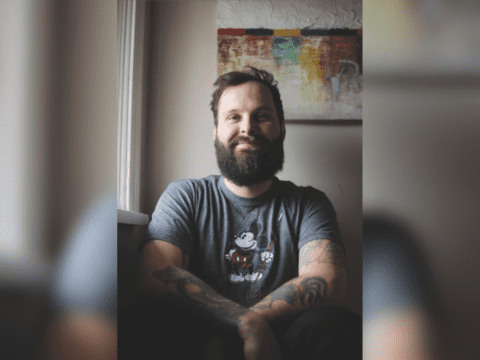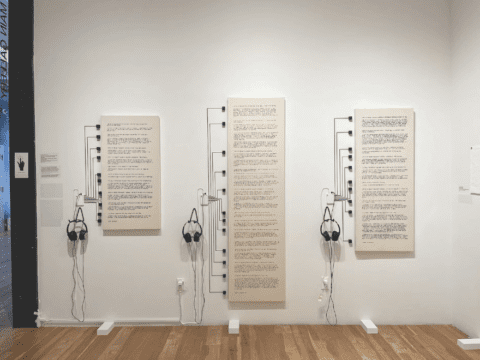The U.S. election is coming up, and some polls suggest Americans could be looking at four more years of a Trump presidency. In his latest book, American Evangelicals for Trump, André Gagné, a former evangelical pastor who’s now a professor of theology at Concordia University in Montreal, dives into the theology and structure of one of Trump’s most fervent voting blocks: white evangelicals.
The Quebec-born author highlights a movement called the New Apostolic Reformation. This rapidly growing, influential sector of the evangelical movement has a transactional relationship with Trump, he argues. The former U.S. president needs their votes to win again. They need him to fulfill a particular vision for America: one where their values dominate every sector of society.
Gagné speaks with Kate Helmore about the theology behind the group, why they chose Trump and how this relationship might play out in the Nov. 5 election.
KATE HELMORE: As someone with a personal background in evangelicalism, and an academic interest in the area, how do you define this facet of Christianity?
ANDRÉ GAGNÉ: The scholar David Bebbington came up with the four characteristics of evangelicalism. The first is called biblical wisdom. To evangelicals, the Bible is central. The second is called conversion, where there’s a necessity to convert to the Christian message. This means that if someone is going in a direction not reflective of God’s will, they will change direction. The third thing is called crucicentrism. This is a focus on the message of the cross as what saves humankind from its sin. It is the sacrificial death of Jesus on the cross that reconciles humankind to God. The last thing he identifies is called activism. Evangelicals are very aggressive in the sense of sharing their beliefs with other people.
But this definition can be problematic. For example, Catholics also believe in the Bible and in the necessity of conversion. The most distinctive marker of evangelicals is their view of the Bible. For many of them, it is inerrant. It is perfect. Catholics have a high view of scripture, but they don’t necessarily share the idea that the Bible is inerrant.
KH: Your book focuses on a specific sect within the American evangelical movement: the New Apostolic Reformation. How does this differ from traditional evangelicalism?
AG: The New Apostolic Reformation is first and foremost a way to conceptualize and understand how churches are governed. It comes from C. Peter Wagner, a missionary who looked into how churches in the Global South were experiencing phenomenal growth. Why were these ones growing compared to other churches that were in decline?
He realized these churches were non-denominational. They functioned autonomously with a pastor who had very strong leadership skills and operated as more of a CEO. The church was run essentially like a franchise. The congregation has a very limited role. They are receptors, and the vision is directed by the pastor. These pastors also designate their successors, and they’re going to designate those who will continue the vision. In this sense, it is very autocratic.
More on Broadview:
KH: Why did you write a book on the New Apostolic Reformation’s support for Donald Trump?
AG: When Trump came on the scene before the 2016 election, he met with evangelicals at Trump Tower. I knew these leaders from when I had myself been an evangelical. I saw them using their rhetoric to get more involved politically. I felt the need to combine my expertise as a scholar with what I knew about those spiritual practices and some of those leaders and their political views to offer a primer to help people get a sense of what evangelicalism in politics is about. Because if you’re an outsider, you don’t understand most of the language that’s going on. I saw my purpose as explaining the potential political derailment if these people got what they wanted.
KH: To an outsider, Trump is an odd choice for Christians. He’s not exactly what many would consider a “God-fearing” man. And yet 80 percent of white evangelicals believe that he represents and fights for their rights. Why?
AG: It’s because Trump listens to them and their grievances. Under the former U.S. president Barack Obama’s administration, they felt they had been ignored. Trump promised them a bunch of things. He told them if it was possible for him to appoint conservative judges on the Supreme Court, he would. And he did appoint conservative judges, which facilitated the reversal of Roe v. Wade. He knew how to speak to evangelical leaders, and they seized the moment. They told their followers that Trump is going to be their greatest defender.
KH: In the book, you spoke a lot about King Cyrus and how some leaders have claimed Trump is a new Cyrus. Who was Cyrus and how does Trump compare?
AG: In 2016, evangelical leader Lance Wallnau wrote a book called Chaos Candidate. He says he got a revelation from God that Trump was this new King Cyrus, an ancient king chosen by God in the book of Isaiah. Cyrus was a pagan. He didn’t follow the God of the Jews, but God used him to liberate them from captivity. They had been kept in Babylonia for several years, and through Cyrus the Babylonians were defeated and the Jews were able to return to their land. Cyrus was an instrument of God despite being a pagan. What the book did was compare Trump to Cyrus: he’s not necessarily the perfect individual, but he has everything to be able to help Christians actually make a difference and bring America back to God.
KH: What does “bringing America back to God” mean to these evangelicals? And how does Trump help them achieve this?
AG: The leaders of the New Apostolic Reformation movement adhere to dominion theology. They wish to exercise their authority over every sphere of society by taking control of political and cultural institutions. Key to this is the concept of the “Seven Mountains” strategy, a mobilizing marketing scheme to get Christians to take control of the spheres of family, religion, education, media, arts and entertainment, business and government. Trump is important for this because they see him as exemplifying how one conquers those mountains. For example, Trump is a leader in arts and entertainment. He had one of the most-watched shows, The Apprentice. When he was on Twitter, he conquered the media. In business, the Trump brand is global. So if you have him as head of the government, that will help Christians penetrate the other spheres. Their relationship with him is transactional. They need Trump. Trump needs them. They don’t mind that he’s not a moral man. That’s not important, because God chose imperfect individuals, and God’s will shall prevail.
KH: In the wake of the attempted assassination of Trump in July, some white evangelicals have interpreted his survival as a miracle. What do you make of this?
AG: Trump’s survival was seen by his evangelical supporters as evidence of God’s protection of the “Chosen One.” But there’s more: some prophetic-leaning leaders even claim to have prophesied an assassination attempt against Trump. For example, this June MorningStar minister and CEO Chris Reed declared having a dream about the attempt against Trump. These “prophets” believe that God chose Trump for a purpose. In the end, we must ask ourselves this question: can an assassination attempt against a president’s life be something
to be expected, due to the nature of his task, without resorting to some kind of divine revelation or prophecy?
KH: It would seem like the divide between the two sides of American politics has become a chasm, especially when we consider that an important part of the Republican voting base —according to you — hopes to instate a Christian theocracy. How can Americans bridge that gap?
AG: It’s going to take a lot of time to get over Trumpism. One day he’ll disappear, but his supporters will still be there. How do you get some common ground? Often the left minimizes or patronizes his supporters — mocking them by not taking what they say seriously. The thing is, these people have a capacity for mobilization much greater than the left has had. So countering by defeating Donald Trump by a very large margin is important. Christians themselves have to stand up. There have been more groups, even among evangelicals, that disagree with Trump and the types of evangelicals who support him. There are always going to be people who are not going away. Even if Trump disappears, they’re going to be there. America is going to have to contend with that for a very, very long time.
This interview has been edited for length and clarity.
***
Kate Helmore is a freelance journalist in Vancouver, B.C.
















Amazing and thought provoking read…
As a Canadian who does not fully understand the American political system, I shuddered to think that any reasonable American voting in the election could elect Trump when it happened in 2016..It makes even less sense now. Neither does it make sense to me that supporters of the Democratic Party would never listen to the evangelical movement supporters. From what I have seen and observed lately, I cannot believe that the Democratic Party would ignore a significant portion of the American people. The biggest tragedy for Canadians is that we can only sit and wait, and deal with what happens in November.
Responding to Debra Leedham
Unfortunately politics has become a popularity contest. As well, the Americans do not have the luxury of having 3 or more parties to choose from. So if I dislike what Harris has to offer, I vote for Trump.
Sadly Americans have divided themselves into parties, rather than issues. For most, there is no room for compromise, nor do they wish to.
It seems to me the Trump supporters are a cult ignoring Trumps decline in cognitive ability, his name calling and threats, his attacks on immigrants and refugees and threatened mass deportations. There are many parallels with Adolf Hitler in Trump’s desire to seek power at all costs including the insurrection of January 6. The Hebrew Scriptures and the New Testament offer teaching completely opposite to Trump’s words and deeds. We are told to welcome the stranger, love our enemies. Live by the golden rule. Evangelicals who form the core of Trump’s support have been brainwashed into forsaking their Christian faith in following this evil man.
If a Christian professes to follow the teachings of Jesus, these Trump followers aren’t Christians. They’re just as dangerous as any terrorist group that wants to impose its will on the whole country. Jesus taught love, forgiveness, living in a relationship with God and adhering to ethical behaviour; a sense of morality to which a true Christian tries to adhere. These folks don’t fit into this “Jesus Teaching” category.